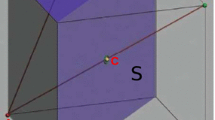Abstract
The feasible set in a Nash bargaining game is a set in the utility space of the players. As such, its points often represent expectations on uncertain events. If this is the case, the feasible set changes in time as uncertainties resolve. Thus, if time for reaching agreement is not fixed in advance, one has to take into account options for delaying an agreement. This paper studies such games and develops a solution concept which has the property that its followers will always prefer to reach an immediate agreement, rather than wait until a new feasible set arises.
Similar content being viewed by others
References
Aumann, R.J.: Integrals of Set-Valued Functions. J. Math. Anal. Appl.12, 1965, 1–12.
Kalai, E., andM. Smorodinsky: Other Solutions to Nash's Bargaining Problem. Econometrica43, 1975, 513–518.
Kihlstrom, R., A.E. Roth andD. Schmeidler: Risk Aversion and Solutions to Nash's Bargaining Problem. To appear in Game Theory and Mathematical Economics. Ed. by O. Moeschlin and P. Pallaschke. Amsterdam 1981.
Kohlberg, E., M. Maschler andM.A. Perles: An Extension of the Super-Additive Solution ton-Person Nash Games. To appear.
Luce, R.D., andH. Raiffa: Games and Decisions. New York 1957.
Maschler, M., andM.A. Perles: The Present Status of the Super-Additive Solution. Essays in Game Theory and Mathematical Economics in Honor of Oskar Morgenstern. Ed. by Aumann et al. Mannheim-Wien-Zürich 1981, 103–110.
Myerson, R.B.: Interpersonal Comparison of Utility and the Timing Effect in Social Choice Problems. Discussion paper No. 321, Graduate School of Management, Northwestern University, Evanston, Ill., 1979.
Nash, J.F.: The Bargaining Problem. Econometrica18, 1950, 155–162.
—: Two Person Cooperative Games. Econometrica21, 1953, 128–140.
Perles, M.A.: Non-Existence of Super-Additive Solutions for 3-Person Games. To appear (a).
-: Non-Symmetric Super-Additive Solutions. To appear (b).
-: Super-Additive Solutions Without the Continuity Axiom. To appear (c).
Rauhut, B., N. Schmitz andE.W. Zachow: Spieltheorie. Stuttgart 1979.
Roth, A.E.: Axiomatic Models of Bargaining. Lecture Notes in Economics and Mathematical Systems, 170. Berlin-Heidelberg-New York 1979.
Schmitz, N.: Two Person Bargaining Without Threats — A Revue Note. Operations Research Verfahren29, 1978, 517–533.
Thomson, W., andR.B. Myerson: Monotonicity and Independence Axioms. Int. J. of Game Theory9, 1980, 37–49.
Author information
Authors and Affiliations
Rights and permissions
About this article
Cite this article
Perles, M.A., Maschler, M. The super-additive solution for the Nash bargaining game. Int J Game Theory 10, 163–193 (1981). https://doi.org/10.1007/BF01755963
Received:
Revised:
Issue Date:
DOI: https://doi.org/10.1007/BF01755963




